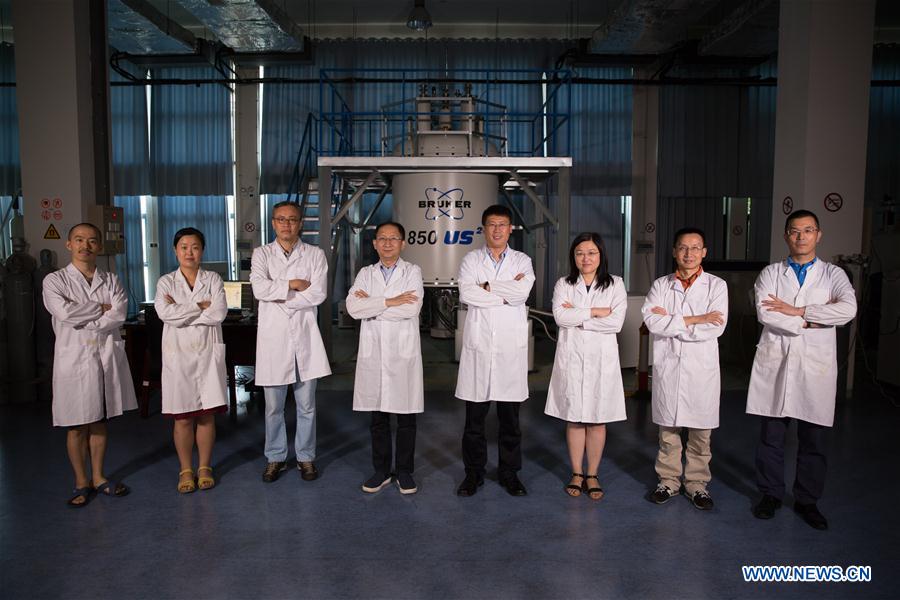

Wang Wenchao, Zhang Xin, Zhang Na, Wang Junfeng, Liu Qingsong, Liu Jing, Lin Wenchu and Ren Tao (L to R) pose at the Hefei institutes of Physical Science of Chinese Academy of Sciences (CASHIPS) in Hefei, capital of east China's Anhui Province, Aug. 17, 2017. The CASHIPS, together with more than ten other research institutes, is located on a peninsula in northwest of Hefei. Thousands of scientific and technologic researchers work on the peninsula, which is called "science island". Wang Junfeng, postdoctoral fellow of Harvard University Medical School and a researcher of CAS hundred talents program, returned from the United States and started his research on the "science island". In the following years, Wang Wenchao, Zhang Xin, Zhang Na, Liu Qingsong, Liu Jing, Lin Wenchu and Ren Tao, seven others postdoctoral fellows of Harvard University Medical School, chose the same way. The eight postdoctoral fellows, whose hometowns are not in Anhui, knew each other in Harvard University. The "science island" in Hefei is a better place for their scientific research. (Xinhua/Guo Chen)
When Wang Junfeng, a Chinese post-doctoral researcher at Harvard Medical School, told his wife in 2009 that they would give up the life they had built in America to move to a small island in east China, she had no idea what he was talking about.
They have now lived on the island for eight years and Wang has built quite an impressive research career there.
Located on the outskirts of Hefei, capital of Anhui Province, the island, home to more than 10 research institutes and 1,000 top researchers like Wang, has been dubbed "Science Island."
Seven of Wang's fellow Chinese researchers at Harvard decided to follow him. Having now been settled on the island for years, they said it is an ideal place for them to quietly carry out their research.
OVERSEAS PARADISE NO MORE
In the 1990s and early 21st century, many Chinese college students flocked to developed countries like the United States to pursue further studies and professions with the help of more advanced research equipment.
Wang Wenchao and Zhang Xin were among them. The couple, who now live and work on Science Island, obtained doctoral degrees on medicine in the U.S. in 2008 after graduating from China's prestigious Peking University.
They then pursued post-doctoral studies at Harvard where they met several other Chinese fellows, including Wang Junfeng.
"Life went on quietly, smoothly, but uneventfully," said Zhang. "Boston was like heaven to our children, but we adults felt something was missing. We were lonely."
Lin Wenchu, another member of the group, said, "It was nice to work abroad, but my long-term dream was always to have my own laboratory where I could do independent research."
When the financial crisis hit the United States hard in 2008 it only aggravated their anxieties. "I couldn't see any promising career outlook," said Wang Wenchao. "Plus, there has always been a glass ceiling for us as foreigners."
OPPORTUNITIES ABOUND IN CHINA
In the past two decades or so, as China's economy blossomed, the country has attached more importance to science and technology, making it an increasingly attractive base for researchers.
Construction began on Science Island in 2008, as one of the major national science projects supported by the National Development and Reform Commission.
Wang Junfeng, who studied high magnetic fields in his doctoral degree, was attracted to the island because advanced experimental equipment on steady high magnetic fields was to be built there. It would make China the fifth country in the world to have such equipment.
"It was a brand-new platform," Wang said, recalling how the project leader convinced him to join the team. "There are boundless possibilities as long as you dare to think and act."
Liu Qingsong, another one of the eight Harvard returnees, said he began to realize the opportunities emerging in China from promotional campaigns staged at overseas universities by Chinese officials, which were intended to attract overseas Chinese talent to return home.
"I felt a warm welcome and received generous offers from Chinese research institutes when I led a 10-strong delegation of Chinese overseas students from America to visit China in 2010," said Liu.
HARD WORK REWARDED
Although they had to start again, almost from scratch, on the island, the researchers have achieved scientific breakthroughs over the years.
In five years, they have built the world's largest high throughput cell selection bank based on cancer kinase targets and a complete research system on tumor medicines with the help of the high magnetic field equipment.
"Our facilities have reached the highest level in the world," said Zhang Na, one of the researchers, adding that China has already caught up with developed countries in terms of research facilities thanks to continuous high level input in the past decade.
Kuang Guangli, leader of the project, said the team has already made an impact on the international academic circle and that the members have made even greater academic achievements here than they did in Harvard.
"They show a good team spirit and are very innovative," Kuang said. (Xinhua)

86-10-68597521 (day)
86-10-68597289 (night)

86-10-68511095 (day)
86-10-68512458 (night)

cas_en@cas.cn

52 Sanlihe Rd., Xicheng District,
Beijing, China (100864)

